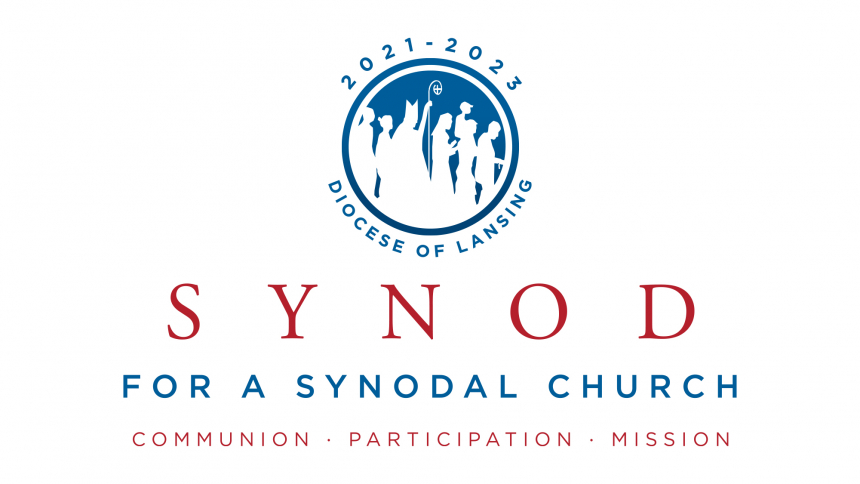
During Sunday Mass at Saint Mary Cathedral on October 17, 2021, Bishop Earl Boyea formally launched the Diocese of Lansing’s participation in the preparatory process towards the 2023 Synod of Bishops in Rome which will discuss the issue of “synodality”.
Bishop Boyea has charged two experienced curial officials with the task of leading diocesan efforts towards the 2023 Synod: Brian Flynn, Director of Middle School & High School Ministry, and Dawn Hausmann, Director of Consecrated Vocations. They are currently in the process of developing a steering group drawn from across the diocese. Reproduced below is Bishop Boyea’s homily from Sunday:
Our Holy Father has asked the entire Church to engage in a two-year synodal process. What does this word mean? Synod is a Greek word which means, “on the way with,” or “on the journey together.” And to be on a journey together implies three things: we are going somewhere, so there is a mission or goal; we are a “we”, that is, this journey involves all of us as a communion; and finally, we are together, that is, we are all engaged with one another, it is a time of participation. Communion, Participation, and Mission are the three themes the Holy Father has centered on.
Our readings today speak to each of these three elements of our journey. Jesus is going up to Jerusalem. He has just told his followers, for the third time, that his mission is not to see the sights, not to visit friends, not to enjoy some vacation time, but to suffer and die and rise. The arguments about who is to sit at the right and the left miss his point. He is going to Jerusalem to make a gift of himself out of love for us and to free us from our slavery to sin. He is going to ransom us from the realm of the evil one so that, as the Letter to the Hebrews states, we can then approach the throne of grace and mercy. Heaven is our goal. Our mission is to proclaim Christ as the way to that goal. Without a clear goal, a clear mission, we will go nowhere and get nowhere. So, for us in this diocese and as part of the Universal Church, this summons to eternal life, this great prize and gift must be kept before our eyes.
Secondly, we are not alone. This journey entails a “we.” Today, we heard a snippet of the fourth and final “Suffering Servant Song” as our first reading from the prophet Isaiah. We heard these words: “through his suffering, my servant shall justify many, and their guilt he shall bear.” Jesus picks up on this theme in the Gospel as he concludes, “For the Son of Man did not come to be served but to serve and to give his life as a ransom for many.”
This part of our synodal path is really emphasized by Pope Francis as he calls it our being a Communion. It is Baptism which gives us our identity card, as the Holy Father would say. He invites us to make this Communion real and not just a title. He is clear that this does not make us a study group. He uses the analogy of how we sit and adore that Lord in Eucharistic devotion. We need to be with one another in the same way all as members of the Body of Christ. Consciously or not, we tend to include in “we” people like us, people who think and live as we do. If the Suffering Servant, who we believe is Jesus himself, came not for some, not for a few, but for many, we need to see many, many more as part of our “we,” walking on this journey. Then we need to be with them and listen to them. This must be intentional, organized, and deliberate. I have mentioned to our priests that all the people in their parish boundaries are their concern, including the fallen away and even the non-believers, but also those of other racial and ethnic groups which we tend not to see. Obviously, this broadening of our sense of “we” takes a lot of effort—first to see them, then to see them as part of our “we” on the journey. This is what being in communion means.
The third element of our synodal path is to engage all of us in this journey to our goal. We need to devise means for the participation of all these others in achieving the mission which we keep before our eyes. It is not enough merely to be aware of the great crowd on the journey with us. We must actively work to journey together. James and John were in it for themselves and we are told that the other ten then became indignant. Jesus would have us not think about ourselves but about the other, always the other, always giving ourselves away, servants of the rest. If we all do this, we will be fully participating as one Body of Christ. Yet, this is so counter-cultural. Our culture promotes the individual, the ego, myself. Here too, we need to be intentional about our following Jesus. Not only does he show us the mission and open up that goal for us by his death, but in John’s Gospel, Jesus told us he is also the way. Engaging one another as fully as we can is to walk together on the way of Jesus.
My sisters and brothers, I am encouraging all of you at the level of your parishes to expand your own parish’s notion of who are the “we” and intentionally seek their broader participation as we move to reach the mission of Jesus Christ, which is always before our eyes, the salvation of souls.
